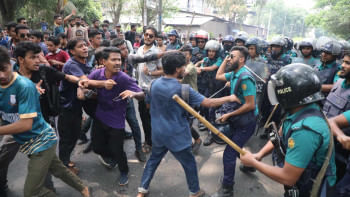Democratic norms
In the last three decades, we have observed the two major political parties making below-the-belt remarks about each other's leader. A political party is defined by others, and defines itself, as much by its ideology as by the leadership it decides to have. It is rather self-serving for any party to insist that its rivals and detractors should not discuss about its leader. A debate about leaders, their flaws and their merits is at the heart of democratic give and take. Leaders do bring value addition to their parties. In fact, most of our political parties are increasingly becoming leader-centric.
It is therefore natural that rivals should want to question the other political parties' leaders. This is the everyday stuff of electoral exchange.
A political party is entitled to put greater emphasis on its programmes and achievements than on its leaders; but the rivals, too, are entitled to try to reverse the order in their sales pitch to the electorate. All that the country can insist on is that political parties remain mindful of good taste and refrain from words, suggestions and insinuations that coarsen the public discourse.
As the two largest formations, the major political parties have a special responsibility for preserving the tone and tenor of a civilized political culture. The ruling party and the opposition are the outcome of democracy. They are political enemies, but they should be enlightened ones. It is said that culture is the refinement of the tongue.
Politicians should refrain from making personal remarks against their rivals. That is the true spirit of democracy. Democracy arises out of the notion that those who are equal in any respect are equal in all respects.

 For all latest news, follow The Daily Star's Google News channel.
For all latest news, follow The Daily Star's Google News channel. 



Comments